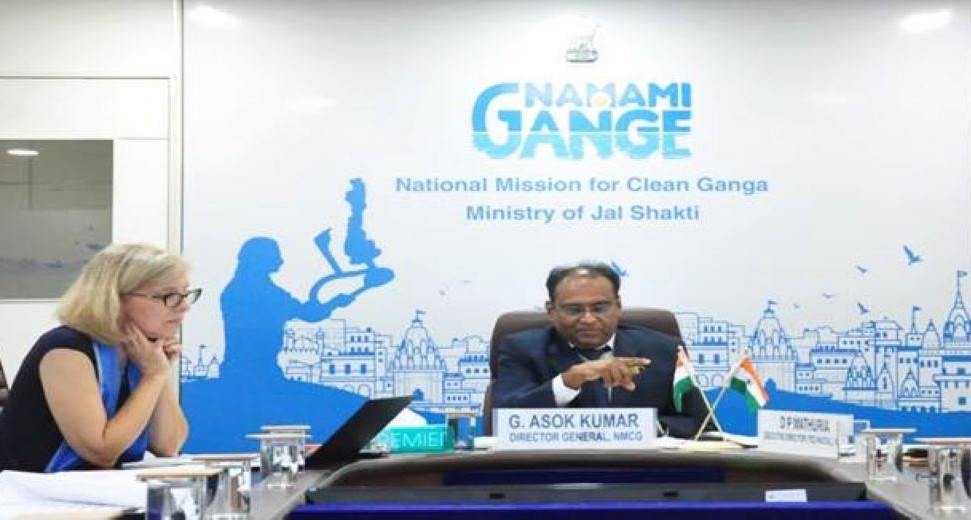
The Director General of the National Mission for Clean Ganga (NMCG) presided over a significant online session during Stockholm Water Week. The session, themed 'Peer Networking for Integrated River Basin Planning and Management,' focused on fostering discussions around the adoption of river basin management strategies. Highlighting the event was the keynote address delivered by G. Asok Kumar, the DG of NMCG, who emphasized the core principles of the Namami Gange initiative.
The Namami Gange initiative, based on five fundamental pillars – Nirmal Ganga (unpolluted river), Aviral Ganga (unrestricted flow), Jan Ganga (People’s Participation), Gyan Ganga (knowledge and research-based interventions), and Arth Ganga (bridging economy and people-river connection) – has garnered global recognition for its efforts in rejuvenating the Ganges river. Notably, it was designated as one of the top 10 "World Restoration Flagships" during the UN Conference on Biological Diversity (COP 15) in Montreal on December 13, 2022.
Kumar highlighted that the Namami Gange Mission, with a substantial financial commitment of USD 4.5 billion, has already made considerable progress in restoring polluted river stretches and enhancing water quality. The initiative has also contributed to the resurgence of aquatic species such as Gangetic Dolphins, Gharials, Turtles, and fish populations, with more than 9.3 million Indian Major Carps and 90,000 Hilsa fish being stocked in the Ganga Basin. To further strengthen conservation efforts, capacity development programs for forest officials have been initiated.
The governance structure of NMCG, comprising five tiers, was outlined by Kumar. He explained the role of District Ganga Committees (DGCs) and their significance in executing interventions related to Arth Ganga. These committees have become increasingly active, with 1689 meetings held between April 2022 and July 2023. Kumar also emphasized the shift towards public participation for comprehensive solutions, showcased through initiatives like 'Igniting Young Minds, Rejuvenating Rivers,' which engages universities in awareness and youth engagement.
The River-Cities Alliance, a novel initiative, was introduced as a dedicated platform for Indian river cities to collaborate on sustainable urban river management. The NMCG has been collaborating with experts, including the GIZ, to strengthen institutions and establish a River Basin Management Unit. This international engagement aims to develop a model for river rejuvenation that can be adopted globally.
The importance of collaborative river basin management efforts was underlined by Martina Burkard, Head of Programme, Support to Ganga Rejuvenation/India EU Partnership GIZ India. She praised NMCG's dynamic approach, highlighting the evolution from comprehensive Ganga basin management plans to implementation-oriented sub-basin plans. Stakeholder engagement and the involvement of districts were central to this approach, leading to the development of District Ganga Plans.
Transboundary cooperation's significance was discussed by Prof. Dorte Ziegler from the University of Applied Sciences, Koblenz. She stressed the interconnectedness of river basins and the shared responsibility of upstream and downstream nations in safeguarding water resources. Collaborative problem-solving and an integrated strategy, as exemplified by NMCG, were noted as key to addressing water-related challenges.
The complexity of water laws and the importance of public participation were discussed by Christian Ebel from the Ministry for Environment, Climate, Energy and Agriculture, Germany. He highlighted the need for states to collectively participate in River Basin Management Committees for effective coordination.
Carmen Rosa Yee Batista, Lead Water Specialist at the World Bank, emphasized scaling up river activities through collaborative efforts, focusing on knowledge-based approaches, data communication, and governmental structures. The session also shed light on the role of self-motivated community cadres like Ganga Praharis, as discussed by Sharmi Palit from the National University of Singapore.
The session was moderated by D.P. Mathuria (ED-NMCG), and the Vote of Thanks was given by Martina Burkard (Head of Programme, Support to Ganga Rejuvenation/India EU Partnership GIZ India). With more than 160 participants, the session showcased the importance of collaborative efforts in shaping effective river basin planning and management.
















